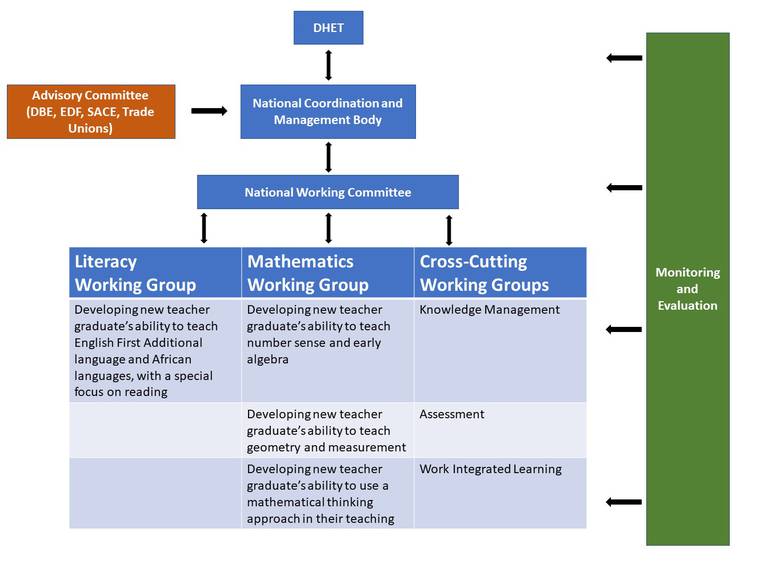PrimTEd’s origins lie in the concern that the country’s teacher training institutions – the universities – were not teaching prospective primary school teachers how to teach reading and writing and mathematics adequately. Further, new teachers were not proficient in teaching English as a First Additional Language (EFAL) – given that from Grade 4 onwards English was the predominant medium of instruction in schools.
Within the broader context of the general consensus that primary education is in a crisis in South Africa it is clear that primary teacher education for literacy and numeracy require radical self-reflection and transformation.
Starting with a series of workshops in 2015, a set of collaborative working groups of primary teacher education academics working in the areas of literacy education and mathematics education were established, with full participation of all universities offering Bachelor of Education programmes for the preparation of primary school teachers (Foundation Phase and Intermediate Phase). The PrimTEd project was then formally established to run for a four year period for the financial years 2015/2016 to 2019/2020. It is now in a close out period.
The PrimTEd project is a component of the Department of Higher Education and Training’s (DHET) Teaching and Learning Development Capacity Improvement Programme (TLDCIP), and as such is under the overall authority of the DHET’s Director-General. It is managed by the Chief-Directorate for Teaching and Learning Development, located in the University Education branch of the DHET. The project is supported financially by the European Union.
Structure of PrimTEd
The engine of the project has been seven Working Groups. Four of these groups were discipline orientated: one for literacy and three for mathematics. Three other working groups were cross-cutting in nature: Knowledge management, Assessment, and Work Integrated Learning. Groups of academics from the participating universities worked collaboratively within these groups, each of which had a coordinator based at one of the universities.
A National Working Committee, with representatives from each working group, the DHET, and from the National Programme Coordination and Management Body, meets biannually to coordinate and synthesise the work of the working groups and make recommendations on Initial Teacher Education (ITE) programmes.
The National Coordination and Management Body is responsible for overall programme management and coordination and provides technical guidance to the working groups. It is also responsible for quarterly and annual reports. Currently this work is done by JET Education Services.
The National Advisory Body has representatives from the DHET, Department of Basic Education (DBE), Education Deans Forum (EDF), South African Council of Educators (SACE), South African Mathematics Foundation (SAMF) and the teacher unions. It assists in reviewing project proposals, reviews progress and will communicate the purpose, progress and achievements of the programme to their constituencies. It meets once a year.
An Annual National Dialogue was held on 17-18 October 2019 at which Teacher Knowledge and Practice Standards developed by the Literacy and Mathematical working groups were discussed prior to their promulgation in 2020.
The outputs of the project
In broad terms the four discipline-based working groups are expected to produce knowledge and practice competence standards for literacy and mathematics teachers and teacher training curriculum frameworks based upon these standards. In due course they will also develop courses, materials and assessment tools to support initial teacher education programmes for primary school teachers. All this will also require capacity development opportunities for teacher education academics.
The three cross-cutting working groups will support the work of the other working groups and collate and publicise the research and recommendations of the working groups.

Evaluations of PrimTEd
An external evaluation of the PrimTEd project was conceptualised as occurring in three phases: a formative phase that focused on the design elements of the project, a second phase focusing on the implementation strategies of the project, and thirdly a results or outcomes phase. Key evaluation questions related to the appropriateness, strengths and weaknesses of the design, whether it was being implemented as planned.
Four evaluation reports have been released